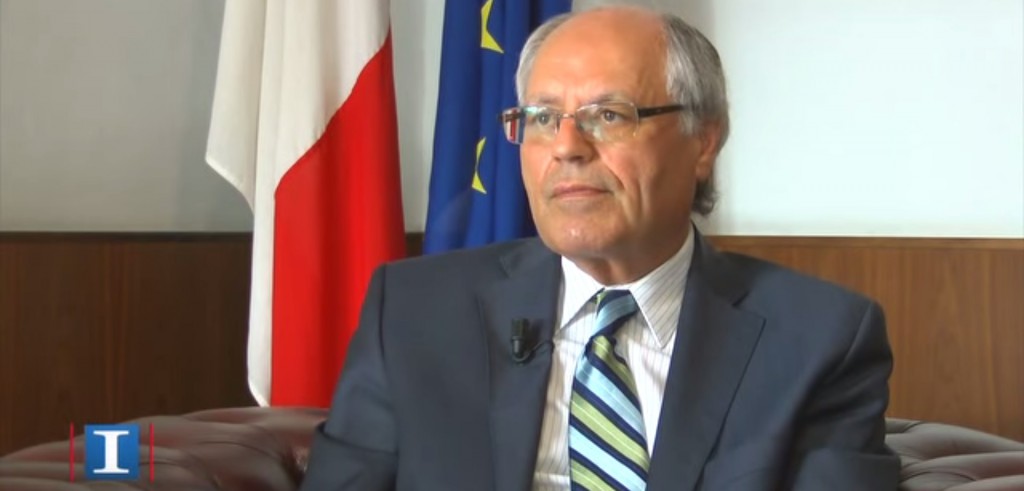Finance Minister Edward Scicluna hits out at the Opposition for ‘brainwashing’ people into opposing the €360 million loan guarantee given to a private company tasked with building the new gas-fired power station, Electrogas, in an interview in today’s issue.
“This does not mean that there should not be an Opposition – I don’t mean it like that – but I think it would help if there were better relations between the two sides.
“There are certain activities which the private sector would not go into: in economics we call it ‘market failure’. For instance, no one would build a lighthouse or a bridge, because how are they going to collect their dues? That’s where government usually steps in, and the old-fashioned model is for the government to step in and built it itself.
“Instead, we are getting the private sector to build it. Therefore there must be some guarantee that the government will be buying the service provided.”
The Minister is visibly frustrated that the Opposition is not playing ball when it comes to the loan guarantee. He points out that, in 2012, the Labour Opposition gave its backing to a €320 million debt guarantee for Enemalta, which was on the brink of defaulting.
Enemalta paying €230 million annually on interest payments
Professor Scicluna points out that Enemalta is paying €230 million a year on interest payments alone to service the €5.2 billion in debts accumulated by Enemalta over 25 years.
This amounts to almost three per cent of Malta’s GDP.
The €360 million loan guarantee given by the government amounts to 80 per cent of the total capital for the power station project. The remaining 20 per cent is being put up by ElectroGas.
Asked why ElectroGas did not put its own assets up as collateral for the loan, Professor Scicluna responds by saying it has put up €90 million of its own money for the project.
“They have put €90 million on the table, and the due diligence process took a long time. Lawyers have certified that the €90 million – the 20 per cent is real. They will have 20 per cent capital and an 80 per cent loan.
“They have borrowed 80 per cent of the project from the four banks, and 20 per cent they are going to provide themselves as capital. They have it.
“The government has not yet delivered the promised security of supply agreement – that is the issue.”
The security of supply agreement is currently being analysed by the European Commission to make sure it does not fall foul of EU state aid rules.
The government is confident that the EU Commission will give the green light to the agreement, meaning the 22-month loan guarantee will be withdrawn.
Professor Scicluna points out that the government has charged ElectroGas €8.8 million for this guarantee.
“It is ironic that we are making a big fuss out of a non-issue. We thought Enemalta might not survive.
“The security of supply agreement is there just in case Enemalta were to default. Through the agreement the government shows it is willing to step in and buy the electricity [from ElectroGas].”
Current reduction in energy charges funded by ElectroGas
Professor Scicluna explains that the government is funding the current reduction in energy charges by virtue of upfront payments made by ElectroGas.
“All the benefits of the new power station investment will be felt over the next 25 years, which is the normal lifespan of such a plant. However, we were suffocating now. We were drowning from the high charges for families and businesses. Either you get the benefits over the 25 years, or you bring some of them up-front.
“We needed them now. It was a brilliant idea. You get the company to pay that amount of money in order to get the rates reductions, and next year it [the power plant] will be up and running.
“The project is more than half-way completed now; the turbines are nearly finished in Sweden.”
The new plant was supposed to be up and running by March 2015. Professor Scicluna says the €320 million Chinese investment in Enemalta meant that the simple partnership between the government and ElectroGas became more complex.
“It is a complicated matter that takes time. You have to ensure that when you sign, you know what you are in for,” Professor Scicluna says.
Economic Crimes Unit needs to be strengthened
The arraignment of former Labour treasurer and election candidate Joe Sammut on charges of money-laundering and creating fictitious companies in order to obtain residency permits for Libyans has raised questions about Malta’s due diligence process.
While saying that the Economic Crimes Unit within the Police Force needs to be strengthened, Professor Scicluna takes solace in the fact that such alleged wrongdoing is being brought to light by the authorities.
“The fact that you then have some people who try to commit fraud does not mean that the whole model is wrong. It’s just that some people might have been fraudulent, so you need a due diligence process.
“The fact is that you have allegedly corrupt people – we’ve had corrupt judges, we’ve had corrupt notaries – it happens. The point is that you have a system which brings it to the surface.”
The Finance Minister states that, at present, Malta may not have an adequate system that caters for rich Libyans wishing to flee the turmoil in their country. “We must admit that a lot of well-to-do families in Libya want to come to Malta one way or another, because they fear for their lives and for their children.
“We have not had a scheme for them. We have a residential scheme – they might use that – we have a passport scheme, but that might not meet their needs. We will review the system and see whether the minimum is too small and so on. There are so many stories. There was also the incident in the iGaming as well. We need to strengthen our Police Economic Crimes Unit.
“We are helping in trying to get the expertise and training because crime today is very sophisticated. You need very good IT people, forensic experts in financial crime. I can assure you that we are working on strengthening these units, especially the one based in my Ministry – the Financial Intelligence Analysis Unit.
“It is doing wonderful work, but it needs other units to work with when it passes an investigation on. It needs someone of calibre who can take up that alleged crime and investigate it.
“I am not going to shock anybody, we do not have that type of expertise, where you have forensic experts in financial crimes who can go to a bank and investigate.
“We might need foreign assistance to help the people who are already here do a better job.”
On Joe Sammut: ‘I would be worried if such cases did not surface’
Asked specifically about Joe Sammut’s case and the government’s silence on the matter, Professor Scicluna questions what more the government could have done.
“What do you expect the government to do? I can assure you that anything of that nature will have a response internally in the government. My Ministry, other Ministries and so on, will start looking at how things could have happened, even though it is a police case.
“Somebody who tricks the system – it could be a notary, we’ve got six notaries who have been using other people’s money. An investigation is being carried out, and I have not issued any statement because the police are still investigating.
“In this case, justice will be served, people will be questioned, and connections and contacts will be investigated.”
“I don’t think we need to be alarmed just because we have these cases. I think we should be alarmed if they don’t surface.”
IIP national wealth fund will be set up in ‘not too distant future’
One of the government’s main selling points of its much-maligned citizenship, or Individual Investment Programme (IIP), scheme was the establishment of a national wealth fund to administer the millions of euros generated by the sale of Maltese passports.
The Finance Minister is evasive when asked what the money will be spent on, and does not say how much money is currently in the fund.
“It is in its initial stages, the arrangement is that the government will keep one-third of the citizenship revenues and two-thirds will go into the wealth fund.
“We will have to see the first year’s full crop and then we will be reporting it. You don’t start with one million or two million, but hopefully, in the not-so distant future, it will be set up.”
Opposition bafflement
Professor Scicluna expresses his belief that the Opposition is truly baffled by the Labour government’s performance when it comes to the economy.
“The Opposition is baffled; in its heart of hearts it believed that this Labour government would not succeed. So when it sees this youngish government going about its business, it is baffled. Unfortunately, if the Opposition were to scrutinise the government on certain issues, people would believe it.
“I think the things it is coming up with are no longer credible,” Professor Scicluna says, citing as an example the furore made over the €360 million loan guarantee.
– 23rd August, 2015


33 responses to “Opposition has ‘brainwashed’ everyone against €360 million loan guarantee”
mexico pharmacies prescription drugs
https://cmqpharma.com/# pharmacies in mexico that ship to usa
mexican rx online
mexican rx online: mexican pharmacy online – best online pharmacies in mexico
canadapharmacyonline legit canadian online pharmacy canadian family pharmacy
mexico pharmacy: mexican rx online – pharmacies in mexico that ship to usa
http://indiapharmast.com/# Online medicine home delivery
reputable mexican pharmacies online: medication from mexico pharmacy – mexican pharmacy
canadian discount pharmacy best online canadian pharmacy canadian pharmacy victoza
canadian valley pharmacy: canadian pharmacy no scripts – best canadian online pharmacy
https://canadapharmast.online/# pharmacy canadian
buying prescription drugs in mexico online: mexican pharmacy – mexican drugstore online
buying prescription drugs in mexico online reputable mexican pharmacies online buying from online mexican pharmacy
mexican pharmacy: mexico drug stores pharmacies – buying prescription drugs in mexico
mexican rx online: mexico drug stores pharmacies – mexican mail order pharmacies
Online medicine order top 10 online pharmacy in india best online pharmacy india
mexico pharmacy: medicine in mexico pharmacies – medicine in mexico pharmacies
http://indiapharmast.com/# online shopping pharmacy india
best online pharmacies in mexico: buying from online mexican pharmacy – mexican online pharmacies prescription drugs
п»їlegitimate online pharmacies india: online shopping pharmacy india – pharmacy website india
http://paxloviddelivery.pro/# paxlovid for sale
amoxicillin 500: cost of amoxicillin 30 capsules – order amoxicillin uk
http://paxloviddelivery.pro/# paxlovid pharmacy
can i purchase amoxicillin online: amoxicillin buy no prescription – amoxicillin azithromycin
https://paxloviddelivery.pro/# paxlovid india
buy amoxicillin online without prescription: buy amoxicillin – amoxicillin 200 mg tablet
http://ciprodelivery.pro/# buy cipro online canada
https://ciprodelivery.pro/# ciprofloxacin 500mg buy online
where to get clomid price: where to get clomid no prescription – where can i get generic clomid no prescription
http://ciprodelivery.pro/# buy cipro online canada
buy amoxicillin 500mg capsules uk: amoxicillin 500mg prescription – amoxicillin 500 mg
http://paxloviddelivery.pro/# paxlovid for sale
https://amoxildelivery.pro/# amoxicillin no prescription
buy ciprofloxacin over the counter: buy cipro – ciprofloxacin 500mg buy online
ciprofloxacin generic: buy cipro cheap – ciprofloxacin mail online